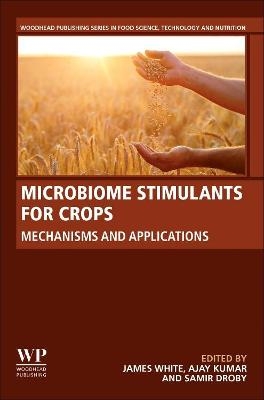
Microbiome Stimulants for Crops
Woodhead Publishing (Verlag)
978-0-12-822122-8 (ISBN)
Dr. James White is Professor of Plant Biology at Rutgers University in New Brunswick, New Jersey, USA. Dr. White obtained the B.S. and M.S. degrees in Botany and Plant Pathology/Mycology from Auburn University, Alabama, and the Ph.D. in Botany from the University of Texas, Austin in 1987. Dr. White specializes in symbiosis research, particularly endophytic microbes. He is the author of more than 400 articles, and author and editor of reference books on the biology, taxonomy, and phylogeny of microbial endophytes, including Biotechnology of Acremonium Endophytes of Grasses (1994), Microbial Endophytes (2000), The Clavicipitalean Fungi (2004), The Fungal Community: Its Organization and Role in the Ecosystem (2005; 2016), Defensive Mutualism in Microbial Symbiosis (2009) and Seed Endophytes: Biology and Biotechnology (2019). He and students in his lab are exploring diversity of endophytic and biostimulant microbes and the various impacts that they have on host plants. Dr. Ajay Kumar is currently working as an assistant professor at Amity Institute of Biotechnology, Amity University, Noida, India. Dr. Kumar completed his tenure (2018-2022) as a visiting scientist from Agriculture Research Organization, Volcani Center, Israel and doctoral research from Department of Botany, Institute of Science, Banaras Hindu University, Varanasi, India on the theme "Plant microbe interaction". In his research tenures, Dr. Kumar has published more than 235 scientific contributions in the form of research and review articles, books or book chapters with the leading International Journals or Publishers. He has wide area of research experience, especially in the field of Plant-Microbe Interactions, Microbial biocontrol, Postharvest management of fruits, Microbial endophytes related with the medicinal plants and cyanobacteria-pesticides interactions. Dr. Kumar actively engaged in editing book with the leading publisher like Elsevier, Springer, CRC Press, Willey and edited more than 48 books and currently serving as an Associate editor in Frontier in Microbiology, BMC Microbiology and special guest editor in Microorganisms or Plants MDPI, Journal. Prof. Samir Droby is a senior research scientist at the ARO, the Volcani Center and Professor of Plant Pathology and postharvest Sciences at the Division of Biochemistry and Food Science at the Robert H. Smith Faculty of Agriculture Food and Environment, The Hebrew University of Jerusalem. Since 2013, he has been serving as the chair of the Postharvest Pathology Subject Matter Committee of the International Society of Plant Pathology. His research expertise include developing biological and natural based control strategies for postharvest diseases, microbiome of harvested commodities, mode of action of yeast biocontrol agents, pathogenicity mechanisms of Penicillium species on citrus and apple fruit and resistance mechanisms of fruits against postharvest pathogens. Prof. Droby has published more than 120 articles in peer-reviewed journals and 25 review articles and 27 book chapters on various topics related to postharvest pathology.
Introduction
1. Microbial endophytes: Evolution, diversity, community functions, and regulation
2. Friends in low places: Soil derived microbial inoculants for biostimulation and biocontrol in crop production
3. The roles of endophytes in modulating plant development
4. Epichloe endophytes stimulate grass development and physiological state in China
5. Endophytic microbes promote plant growth and alter host secondary metabolites
6. Epichloe endophytes of grasses, in particular their physiological interaction with plants
7. Potential application of plant growth promoting bacteria in bioenergy crop production
8. Soil microbiome to maximize the benefits to crop plants - A special reference to Rhizosphere microbiome
9. Belowground dialogue between plant roots and beneficial microbes
10. Microbial?bio-active?compounds?in plant disease management
11. Microbial biocontrol formulations for commercial applications
12. Potential effect of microbial biostimulants in sustainable vegetable production
13. Microbes as bio stimulants: Tissue culture prospective
14. Biostimulants application in agriculture under abiotic stress conditions
15. Actinomycetes as bio stimulants and their application in agricultural practices
16. Role of microbial volatiles as an aromatic tool in management of crop productivity
17. Microbial consortia: approaches in crop production and yield enhancement
18. ?Fungal enzymes and their potential application as bio stimulants
19. Microbial cell factories for treatment of soil polluted with heavy metals: A green approach
20. Arbuscular Mycorrhizal Fungi (AMF) as plant biostimulants
21. Nanobiotechnology of plant microbiome
22. Microbiome establishment, adaptation and their contributions to anaerobic stress tolerance and nutrient acquisition in rice
23. Soil physical and nutritional balance are essential for establishing a healthy microbiome
24. Microbiome stimulants for crops: Indicators for an Economically proficient sustainable agriculture
25. Plant microbiome: Diversity, distribution, and functional relevance in crop improvement and sustainable agriculture
26. Gene expression studies in crop plants for diseases management
27. Biomanagement of Fusarium spp. associated with oil crops
| Erscheinungsdatum | 06.04.2021 |
|---|---|
| Sprache | englisch |
| Maße | 216 x 276 mm |
| Gewicht | 1430 g |
| Themenwelt | Naturwissenschaften ► Biologie ► Botanik |
| Naturwissenschaften ► Biologie ► Mikrobiologie / Immunologie | |
| Weitere Fachgebiete ► Land- / Forstwirtschaft / Fischerei | |
| ISBN-10 | 0-12-822122-4 / 0128221224 |
| ISBN-13 | 978-0-12-822122-8 / 9780128221228 |
| Zustand | Neuware |
| Informationen gemäß Produktsicherheitsverordnung (GPSR) | |
| Haben Sie eine Frage zum Produkt? |
aus dem Bereich


